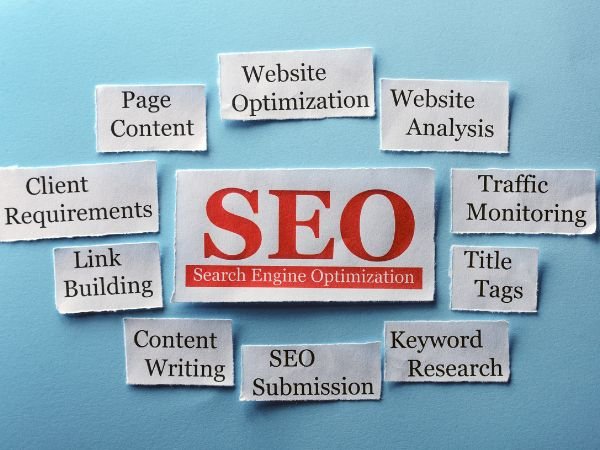Physical Address
304 North Cardinal St.
Dorchester Center, MA 02124
In today’s digital landscape, having a website is essential for any business, but simply having a website isn’t enough. To stand out in a crowded online marketplace, your website needs to be optimized for search engines—a process known as SEO, or Search Engine Optimization. This article will explore the concept of SEO, the importance of SEO for a website, and how effective SEO techniques for websites can significantly contribute to your website’s growth and ranking.
SEO, or Search Engine Optimization, is the process of enhancing a website’s visibility in search engine results pages (SERPs). When someone searches for a term related to your business, SEO helps your website appear higher in the search results, making it more likely that potential customers will visit your site.

SEO for websites is a broad term that encompasses various strategies and techniques aimed at improving the site’s rankings on search engines like Google, Bing, and Yahoo. These techniques range from optimizing on-page elements, such as content and meta tags, to building high-quality backlinks and ensuring the site is technically sound.
One of the primary benefits of SEO for websites is increased visibility. The higher your website ranks in the SERPs, the more likely people are to click on your link. Most users don’t go beyond the first page of search results, so ranking high is crucial. By implementing effective SEO techniques for websites, you can improve your site’s visibility, driving more organic traffic to your site.
SEO is one of the most cost-effective marketing strategies available. Unlike paid advertising, where you pay for each click or impression, organic traffic driven by SEO is free. Although SEO requires an initial investment in time and resources, the long-term benefits far outweigh the costs. Once your website starts ranking higher, you’ll continue to receive traffic without ongoing costs, making SEO a sustainable marketing strategy.
Websites that rank high in search results are often perceived as more credible and trustworthy by users. Search engines like Google use various factors, such as content quality, backlinks, and user experience, to determine rankings. By focusing on these factors through SEO, you can improve your site’s authority and reputation, which in turn builds trust with your audience.

SEO isn’t just about search engines; it’s also about improving the user experience on your website. Techniques such as optimizing page load speed, ensuring mobile-friendliness, and improving navigation all contribute to a better user experience. Search engines prioritize websites that offer a positive experience to users, so focusing on these elements as part of your SEO strategy will not only improve your rankings but also enhance the overall experience for your visitors.
In today’s competitive online marketplace, SEO for websites is essential to stay ahead of the competition. If your competitors are investing in SEO and you’re not, they’re likely to outrank you in search results, capturing more of the available traffic. By implementing effective website SEO strategies, you can level the playing field and even surpass your competitors in search engine rankings.

To fully understand the impact of SEO on website growth and ranking, it’s essential to delve into the specific SEO techniques for websites that can be employed. These techniques can be broadly categorized into on-page, off-page, and technical SEO.
On-page SEO refers to the optimization of elements on your website that are within your control. These include content, meta tags, images, and internal linking.
Off-page SEO involves activities outside your website that impact your rankings. The most important off-page SEO techniques for websites include link building, social media marketing, and influencer outreach.
Technical SEO focuses on the backend of your website, ensuring that it meets the technical requirements of search engines for crawling and indexing. Key aspects of technical SEO include website speed, mobile-friendliness, and secure connections (HTTPS).
Implementing successful website SEO strategies requires a holistic approach that combines on-page, off-page, and technical SEO techniques. Here are some steps to develop an effective strategy:
Before implementing any SEO techniques for websites, it’s important to conduct a thorough SEO audit. This audit will help you identify areas of improvement, such as broken links, duplicate content, slow page speed, and other issues that may be affecting your rankings.
Setting clear, measurable goals is crucial for the success of your SEO strategy. Whether your goal is to increase organic traffic, improve conversion rates, or boost your website’s rankings, having specific objectives will guide your SEO efforts and help you measure progress.

Understanding user intent—the reason behind a search query—is key to creating content that meets the needs of your audience. By aligning your content with user intent and incorporating relevant keywords, you can improve your website’s relevance and ranking in search results.
Content is still king in the world of SEO. Creating high-quality, relevant content that addresses the needs and pain points of your audience is crucial for improving rankings. Focus on producing content that is informative, engaging, and valuable to your target audience.
SEO is an ongoing process that requires regular monitoring and analysis. Use tools like Google Analytics and Google Search Console to track your website’s performance, identify areas for improvement, and adjust your strategy as needed.
SEO for websites is not just an option; it’s a necessity in today’s competitive digital environment. By understanding the importance of SEO and implementing effective website SEO strategies, you can significantly improve your site’s visibility, attract more organic traffic, and achieve long-term success. Whether you’re just starting with SEO or looking to refine your existing strategy, focusing on both on-page and off-page SEO techniques, along with technical SEO, will set your website on the path to growth and higher rankings.
Investing in SEO is investing in the future of your website. As you optimize your site, remember that SEO is a marathon, not a sprint. Consistent, strategic efforts will yield the best results, helping your website thrive in the ever-evolving digital landscape.